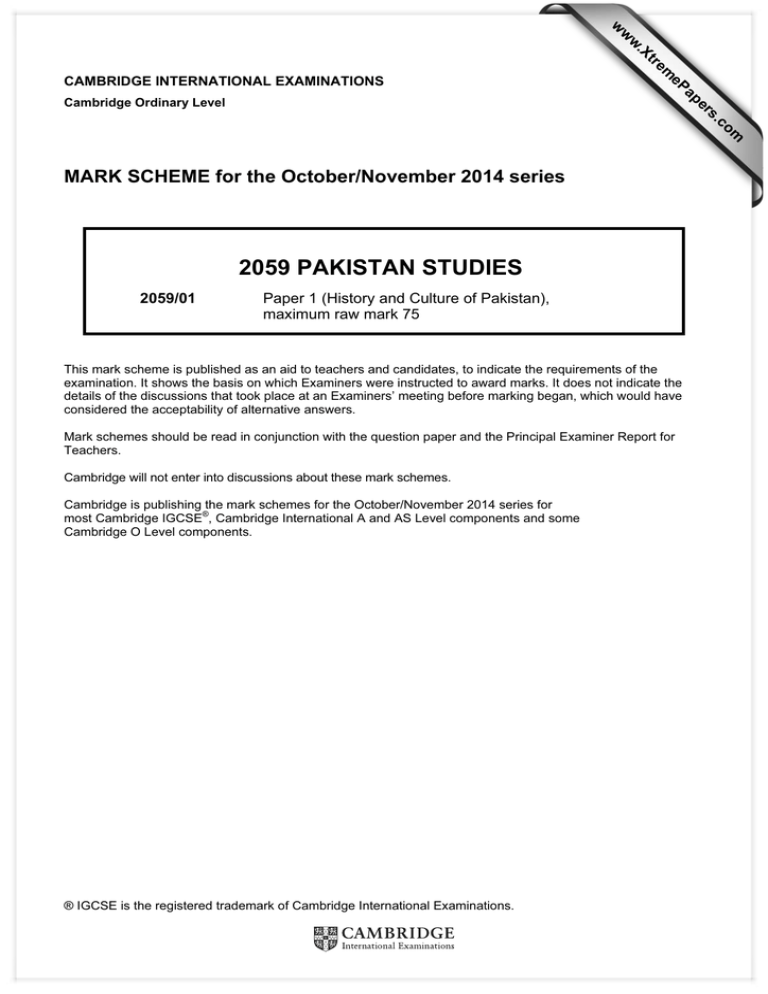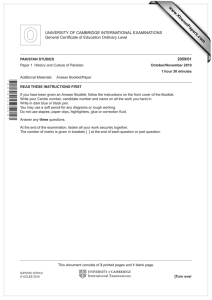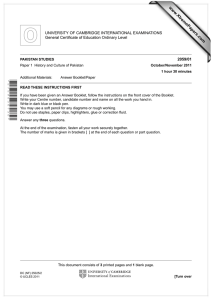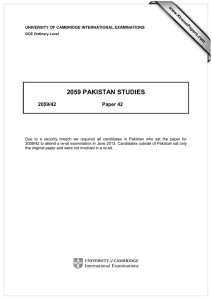2059 PAKISTAN STUDIES MARK SCHEME for the October/November 2014 series
advertisement

w w ap eP om .c s er Cambridge Ordinary Level m e tr .X w CAMBRIDGE INTERNATIONAL EXAMINATIONS MARK SCHEME for the October/November 2014 series 2059 PAKISTAN STUDIES 2059/01 Paper 1 (History and Culture of Pakistan), maximum raw mark 75 This mark scheme is published as an aid to teachers and candidates, to indicate the requirements of the examination. It shows the basis on which Examiners were instructed to award marks. It does not indicate the details of the discussions that took place at an Examiners’ meeting before marking began, which would have considered the acceptability of alternative answers. Mark schemes should be read in conjunction with the question paper and the Principal Examiner Report for Teachers. Cambridge will not enter into discussions about these mark schemes. Cambridge is publishing the mark schemes for the October/November 2014 series for most Cambridge IGCSE®, Cambridge International A and AS Level components and some Cambridge O Level components. ® IGCSE is the registered trademark of Cambridge International Examinations. Page 2 1 Mark Scheme Cambridge O Level – October/November 2014 Syllabus 2059 Paper 01 At first the East India Company had a neutral point of view towards religion in India. However, with the work of missionaries in the sub-continent, the Christian faith of British people living in India was strengthened. As a result people became more intolerant of Indian traditions and behaviour and the British began to impose changes on the way Indians lived, which caused resentment and anxiety. (a) What was suttee? [4] Reward each correct statement with 1 mark. 2 marks can be awarded for a developed statement. Candidates might refer to: A Hindu tradition, ritual burning of widows on funeral pyre of husbands. British tended to ignore the practice because of the fear of offending high-caste Hindus serving in the British army and civil service. In 1813 stated it was voluntary and would only be banned if Hindu religion opposed it, the widow was under 16 or intoxicated or pregnant. Practice outlawed by EIC in Bengal in 1829 and later in rest of India by Governor General Lord Bentinck. Suttee remained legal in some princely states. Isolated instances occurred in 20th century. (b) Why did Sir Syed Ahmad Khan try to improve relations between the Muslims and the British? LEVEL 1: Simplistic statement He believed in them. LEVEL 2: Identifies reasons He wanted to see Muslims prosper and improve their conditions. [1] [2–4] LEVEL 3: Explains reasons [5–7] If they were to improve their poor status, then the Muslims had to accept more British ideas and take advantage of British education. He wanted to improve their social and economic conditions by taking up posts in the civil service and the army. If they didn’t do these things, then they would see the Hindus prosper at their expense. © Cambridge International Examinations 2014 Page 3 Mark Scheme Cambridge O Level – October/November 2014 Syllabus 2059 Paper 01 (c) “The strength of the British army was the sole reason for the failure of the War of Independence by 1858.” Do you agree? Give reasons for your answer. LEVEL 1: Simplistic statement The British were better. [1–2] LEVEL 2: Description of/identifies reasons The opposition to the British was too weak. [3–6] LEVEL 3: Explains the strength of the British or other reasons [7–10] LEVEL 4: Explains the strength of the British and other reasons [9–13] The British had more modern methods of fighting and the army was better disciplined as well as being supplied by some of the local rulers. The British were also skilled diplomats so they were able to keep other areas of India under their control. There was also a lack of unity and common cause amongst the Indian population. The Punjab was uninterested in helping the rebellion and actually sent men and supplies to help the British. Some of the Indian princes were only interested in restoring their own powers and this often depended upon the support of the British. This explains why the ruler of Kashmir sent troops to help the British. Muslims were more likely to oppose the British in the war but there was no sense of unity with Sikhs and Hindus who were less likely to support them in their cause. Although there were a series of uprisings against the British, the Indians lacked coordination and strength in depth. As a result they were overcome by the British. LEVEL 5: As Level 4 – also produces a judgement or evaluation © Cambridge International Examinations 2014 [14] Page 4 2 Mark Scheme Cambridge O Level – October/November 2014 Syllabus 2059 Paper 01 Bengal was the largest province of India with a population of 85 million people. Lord Curzon, the newly appointed Viceroy believed that Bengal was too large to be governed efficiently as a single province and in 1903 proposed that it should be split into two, West Bengal and East Bengal. (a) Describe the Swadeshi Movement. [4] Reward each correct statement with 1 mark. 2 marks can be awarded for a developed statement. Candidates might refer to: Formed in response to partition by the Hindus between 1903 and 1905. Hindus were furious with the partition as they saw it as part of the British ‘divide and rule’ policy. Swadeshi Movement was a boycott of British goods and bought only Indian produced goods. British sugar, salt and cloth especially suffered and cotton in particular. British cloth was burnt on bonfires. People picketed the shops selling foreign goods. (b) Explain why the Muslim League was formed in 1906. LEVEL 1: Simplistic statement They wanted their own party. LEVEL 2: Identifies reasons The Muslims were not united. The Hindus had their own party. [1] [2–4] LEVEL 3: Explains reasons [5–7] Muslim rights would not be advanced if they continued to rely on the Indian National Congress. It was seen as an organisation which would only advance Hindu views. The Congress was demanding that India should be treated as a cultural whole and Hindi should be declared the official language. By not organising a Muslim group they would continue to be disorganised and disunited. Even more worrying was the growth of extreme Hindu nationalist groups who demanded that Muslims be forcibly converted to Hinduism. Therefore a number of prominent Muslim leaders founded the Muslim League. © Cambridge International Examinations 2014 Page 5 Mark Scheme Cambridge O Level – October/November 2014 Syllabus 2059 Paper 01 (c) Were the Montague–Chelmsford Reforms the main reason for the outbreak of violence across India in 1919? Explain your answer. LEVEL 1: Simplistic statement The reforms were hated. [1–2] LEVEL 2: Describes or identifies reasons [3–6] MC Reforms were proposed in 1918 and wanted a national parliament with two Houses and a Legislative Assembly. The British fired on a crowd in Amritsar. LEVEL 3: Explains Montague–Chelmsford reforms or other reasons [7–10] LEVEL 4: Explains Montague–Chelmsford reforms and other reasons [9–13] These Reforms that became the Government of India Act in 1919 disappointed the Muslims and Hindus as they had hoped for greater concessions. Central government reserved sweeping powers for itself with only minor concessions for the locals. The Reforms did hold out concessions to political parties provided that they accepted the right of the British to remain in control. The Indians, led by Gandhi, bitterly attacked the proposals and this led to anger and frustration, although Gandhi warned against a violent response. Indians who had supported Britain in World War One were looking forward to the principle of self-determination, which the Allies had promised nations after the war, being implemented. However, this was not to be the case with India. British politicians, especially in the Labour Party, were sympathetic to Indian self-government and it was this frustration that nothing was being done after the war despite apparent British support in some quarters that led to further frustration in the sub-continent. The Rowlatt Act of the same year increased the resentment of Indians by including the right of arrest without a warrant and detention without bail. Increasingly, there were waves of violent protest across India and the British were worried that there would be a repeat of 1857. A peaceful protest in Amritsar led to many hundreds of Indians being killed by General Dyer’s troops. The British were determined to keep a firm hold on India. LEVEL 5: As Level 4 – also produces a judgement or evaluation © Cambridge International Examinations 2014 [14] Page 6 3 Mark Scheme Cambridge O Level – October/November 2014 Syllabus 2059 Paper 01 In 1927 the British government set up a commission chaired by Sir John Simon as provided for under the terms of the 1919 Government of India Act. The commission was to look into the situation in India but none of its members was an Indian. This was considered an insult by the Congress party which decided to boycott the commission. (a) What was the Nehru Report? [4] Reward each correct statement with 1 mark. 2 marks can be awarded for a developed statement. Candidates might refer to: 1928, constitutional guarantee of fundamental rights including freedom of conscience and liberty, central government responsible for peace and order, Dominion Status, India to become a federation with a two-chamber parliament, protection of minorities, the vote for all men and women. Gandhi also proposed that Britain should have one year to accept the recommendations of the Nehru Report or face a campaign of non-cooperation. (b) Why was Dr Allama Iqbal an important influence on the struggle for a separate homeland for Pakistan? LEVEL 1: Simplistic statement He was the greatest poet and philosopher of Pakistan. LEVEL 2: Identifies reasons He said there should be a separate state for Muslims. [1] [2–4] LEVEL 3: Explains reasons [5–7] Iqbal was the first Muslim politician to demand a separate state for Pakistan which he advocated in 1930. This was important since it provided a focus for the Muslims to work towards during the next 15 years. As a poet and philosopher he advocated the need for a solid foundation for Muslims in Islam and the Holy Quran and provided the intellectual basis for the debate for a separate homeland. Finally, he recognised the talent in Jinnah as the natural leader of the Muslims in their demands for a separate homeland. © Cambridge International Examinations 2014 Page 7 Mark Scheme Cambridge O Level – October/November 2014 Syllabus 2059 Paper 01 (c) Were concerns about British policies towards Muslims the most important reason for the foundation of the Khilafat Movement? Explain your answer. LEVEL 1: Simplistic statement [1–2] LEVEL 2: Identifies reasons for foundation of the Khilafat Movement or describes the Movement [3–6] Muslims distrusted the British. Muslims were worried about the break-up of the Ottoman Empire. They met with Lloyd George, the British Prime Minister, during the War. LEVEL 3: Explains concerns about British policies towards Muslims or other reasons [7–10] LEVEL 4: Explains concerns about British policies towards Muslims and other reasons [9–13] Muslims distrusted British policies, especially after the First World War and the Rowlatt Act and other legislation. They were concerned that the British were encouraging Muslims to fear the Hindus so that Muslims would cooperate more with the British. They were also worried about how British rule in Afghanistan and Persia had paid little attention to the views of Muslims there and were worried that the same was happening in India. Muslims held the Caliphate of Turkey in high regard and were not prepared to see Turkey split up after the War and thus the Caliph abolished. They feared this would happen when the British government promised that the status of the Caliph would be respected in order to get the Muslims to fight alongside the Allies during WW1. The Muslims expressed their views to the British government during the war and it promised that no harm would be done to the Caliphate. However, this promise was not kept at the end of the war since the Turkish Empire was broken up. Also, the institution of the Caliphate was to be abolished. After the war ended, reports from Europe suggested that the British and French wanted to punish the Turks for their support of the Germans. The imprisonment of several Indian Muslims during the war also contributed to the anger felt. As a result, the Khalifat Movement was founded. LEVEL 5: As Level 4 – also produces a judgement or evaluation © Cambridge International Examinations 2014 [14] Page 8 4 Mark Scheme Cambridge O Level – October/November 2014 Syllabus 2059 Paper 01 In 1962, Ayub Khan introduced a new constitution that was largely made up of his own proposals. The new constitution was aimed at making Ayub Khan’s position more secure and guaranteed far-reaching powers for the President. It was disliked by many people, especially those in East Pakistan who felt that they would have little part in governing Pakistan. As a result within a decade there was a need to introduce a new constitution. (a) Describe the terms of the 1973 Constitution. [4] Reward each correct statement with 1 mark. 2 marks can be awarded for a developed statement. Candidates might refer to: Introduced by Bhutto. Pakistan to become a federal republic with parliamentary system of government. PM to be head of government. Pakistan an Islamic Republic with Islam the state religion. PM and President to be Muslims. Fundamental human rights to be recognised with Supreme and High Courts to enforce these. PM agrees to President’s orders but advises President. Upper House (Senate) to be elected and must not be dissolved. Emergency powers for government. Armed forces not to take part in political activities. (b) Why were there so many governments between 1951 and 1958? LEVEL 1: Simplistic statement Pakistan was weak. [1] LEVEL 2: Identifies reasons [2–4] Jinnah had died and there were major problems in running the new country. Politicians were inexperienced. LEVEL 3: Explains reasons [5–7] Jinnah had died in 1948 and Liaquat Ali Khan was assassinated in 1951. The country was struggling to establish itself without these two experienced figures. The problems of running a new country were very difficult to overcome and India had not been forthcoming in sharing out the joint assets. The problems associated with managing the Kashmir issue and relations with India over it were very difficult with no agreement on its future. The formation of East Pakistan brought with it problems relating to the capital being located in West Pakistan, and the refusal to have Bengali as the main language was a source of discontent and conflict. Together with a plethora of assassinations of leading figures, inexperienced politicians were having great difficulty running the country, and as a result there was a lack of stability in governing and this led to many different governments being formed during these years. © Cambridge International Examinations 2014 Page 9 Mark Scheme Cambridge O Level – October/November 2014 Syllabus 2059 Paper 01 (c) Was the promotion of Islamic values the most important achievement of General Ziaul-Haq’s domestic policies between 1977 and 1988? Explain your answer. LEVEL 1: Simplistic statement Zia had a strict regime. [1–2] LEVEL 2: Describes the Islamic laws or identifies achievements Zia introduced Islamic laws which included the Hudood, Zina, and Zakat Ordinances. [3–6] LEVEL 3: Explains promotion of Islamic values or other domestic policies [7–10] LEVEL 4: Explains promotion of Islamic values and other domestic policies [9–13] Zia introduced Islamic laws in an attempt to produce a strong and stable government managed by people committed to Islamic values. He ignored the political process and therefore the Islamic laws were very strict in order to produce a strong government. With regard to economic affairs, efforts to increase investment were met with some success since many of the previous nationalisation programmes were reversed and the private sector was encouraged to re-invest. Between 1977 and 1986, the average growth rate was 6.2%, amongst the highest in the world at that time. Pakistanis working overseas contributed to this growth by sending money home to their families. Zia tried to build up investors. Confidence in Pakistani industry was increased by de-nationalising many firms. This aimed to increase local and foreign investment in industries. Efforts were also made to increase the efficiency of government-run industries. There was a need by Zia to establish a measure of legitimacy to his presidency by declaring legal all the military actions since 1977. The passing of the Eighth Amendment in 1985 gave the President the power to dismiss the Prime Minister of the time. As a result of this, martial law was lifted but Zia remained President, unchallenged. LEVEL 5: As Level 4 – also produces a judgement or evaluation © Cambridge International Examinations 2014 [14] Page 10 5 Mark Scheme Cambridge O Level – October/November 2014 Syllabus 2059 Paper 01 Benazir Bhutto described her time as Prime Minister as problematic: ‘I found that people opposed me simply on the grounds that I was a woman. The clerics took to the mosque saying that Pakistan had thrown itself outside the Muslim world by voting for a woman, that a woman had taken a man’s place in an Islamic society. My opponents reduced themselves to verbal abuse rather than discuss issues simply because I was a woman.’ (a) Describe the problems caused by family feuds that faced the Benazir Bhutto governments. [4] Reward each correct statement with 1 mark. 2 marks can be awarded for a developed statement. Candidates might refer to: Quarrelled with her mother Begum Nusrat Bhutto over control of the PPP, with Begum favouring Benazir’s brother Mir Murtaza as leader. Begum removed from a leading role in the PPP. Murtaza went into exile and founded the Al-Zulfikar Organisation. He used this to criticise Benazir. He also opposed her husband’s involvement in the PPP because of the allegations of corruption against him. Zardani accused of paybacks on property and government deals and being involved in political murders. Known as Mr 10%. Murtaza arrested on his return to Pakistan on charges of terrorism in 1993. In 1996 he was killed in a police ambush and a judicial review of the incident found government involvement in it. (b) Why did Pakistan distrust India so much between 1971 and 1988? LEVEL 1: Simplistic answer India was Pakistan’s enemy. LEVEL 2: Identifies reasons Because of Simla and the nuclear testing programme. [1] [2–4] LEVEL 3: Explains reasons [5–7] Pakistan was unhappy with the Simla agreement signed with India following the war. In return for the release of 90 000 prisoners of war, Pakistan agreed not to pursue a solution to the Kashmir problem in international forums. This annoyed Pakistan which had sought a solution through the United Nations. Pakistan was also shocked at India’s nuclear test programme in 1974. It raised real fears that its neighbour had a nuclear capability. Relations became even worse when India suspected that Pakistan was training Sikh extremists and when Indira Gandhi was assassinated by a Sikh in 1984. © Cambridge International Examinations 2014 Page 11 Mark Scheme Cambridge O Level – October/November 2014 Syllabus 2059 Paper 01 (c) How successful was Pakistan in its relationship with Afghanistan between 1947 and 1999? LEVEL 1: Simplistic statement Relationships have been good. [1–2] LEVEL 2: Description of relationship [3–6] Diplomatic relations started in 1948. Visits by the leaders of the two countries have been undertaken since then. LEVEL 3: Explains successes or failures [7–10] LEVEL 4: Explains successes and failures [9–13] Successes Leaders of the two countries have visited each other which has helped to improve relationships between them. Zahir Shah wanted to be friendly with Pakistan and during the 1965 war remained neutral despite pressure from India and Russia. Failures Afghanistan has violated a trade agreement on several occasions. Diplomatic relations were severed due to hostility between the two countries but were later renewed. During the Afghan–Russian war, Afghanistan violated Pakistan airspace and bombed Pakistani areas. Problems relating to drugs, armed robberies, kidnappings and gun battles between rival gangs in the border region. Increase in terrorist problem. LEVEL 5: As Level 4 – also produces a judgement or evaluation © Cambridge International Examinations 2014 [14]


